The rise of AI browsers is revolutionizing internet navigation. Two innovative platforms. The Browser Company's Comet and Dia browser are spearheading this revolution in 2025.
With intelligent, AI-powered experiences that comprehend context, automate tasks, and function as virtual companions rather than merely web browsers, these agentic browsers promise to replace conventional browsing.
Table of Contents
What Are AI Browsers and Why Do They Matter?
Understanding Next Generation Browsers
Browsers with AI capabilities mark a paradigm change from passive web navigation to proactive digital support. These intelligent web browsers, in contrast to more conventional ones like Chrome or Safari, incorporate artificial intelligence right into the browsing process, allowing them to:
- Recognize commands and queries in natural language
- Examine content in several tabs at once.
- Automate routine web processes and tasks.
- Adapt contextual help to your browsing habits.
- Conduct intricate research and synthesize data.
The ability of AI browsers to integrate browser automation with large language models to create systems that can plan, think, and act on behalf of users is at the heart of the "how do AI browsers work 2025" question.
The Agentic Revolution: What Is an Agentic Browser Explained
Agentic browsers are more than just AI integration. Without continual human input, these systems are able to make decisions, carry out multi-step workflows, and adjust to changing circumstances. They are referred to as "agentic" because they behave as independent agents with the capacity to comprehend objectives and choose the most effective course of action to reach them.
Comet: The Research-Focused AI Browser
Core Features and Capabilities
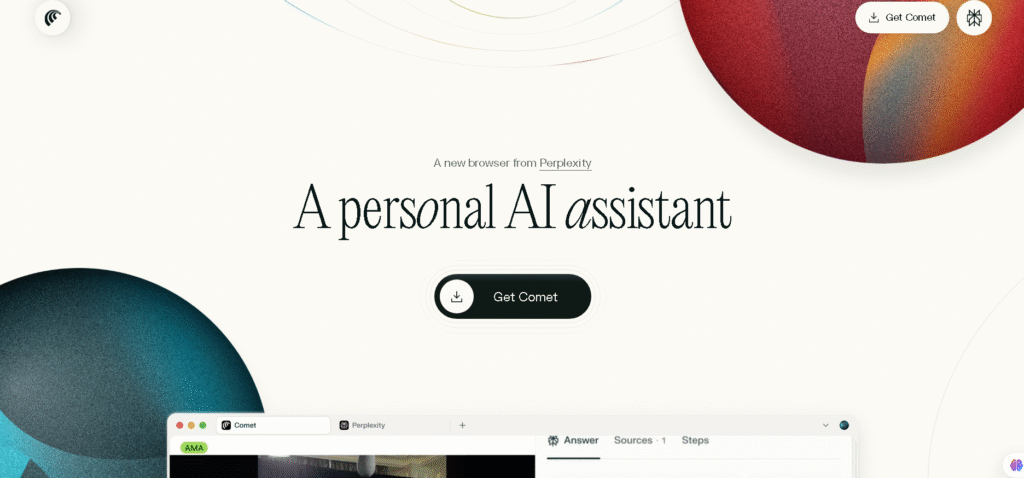
The review and features of the Perplexity‘s AI Browser Comet show a system designed especially for information synthesis and research. Important points to note are:
- Deep Search Integration: Comet provides immediate, cited answers right within the browser interface by utilizing Perplexity's AI search engine. Without visiting several websites, users can pose intricate queries and get thorough answers.
- Contextual Memory: The browser keeps track of ongoing discussions, enabling follow-up inquiries and expanding on earlier queries. Traditional browsers just can't keep up with the research flow that these produces.
- Support for Voice Commands: An AI browser that can operate hands-free thanks to voice commands makes research easier and more effective.
- Multi-Tab Synthesis: Comet can generate cohesive summaries or comparisons by analyzing content from several open tabs.
Technical Specifications
Comet, which is based on the Chromium framework, adds its proprietary AI layer while guaranteeing compatibility with current Chrome extensions. The browser incorporates:
- The GPT-4o and Claude models serve as the foundation for Perplexity's answer engine.
- The ability to crawl websites in real time
- Advanced source organization and citation tracking
- Intelligent tools for summarizing content
Pricing and Availability
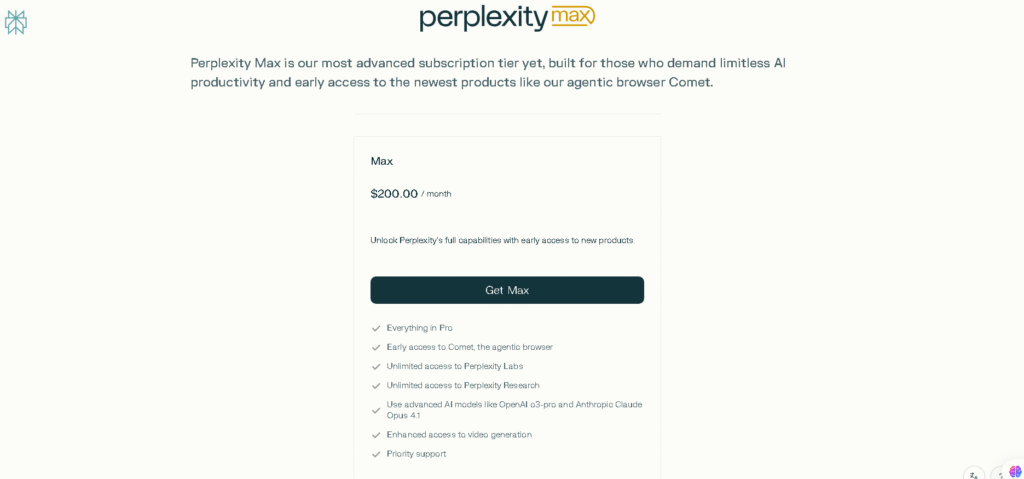
For complete access to the Comet browser's advanced features, a Perplexity Max subscription ($200/month) is currently required. Current Perplexity Pro users are eligible for early access.
Dia AI Browser: The Productivity Powerhouse
Revolutionary Workflow Automation
The Dia browser adopts a different strategy, emphasizing task automation and productivity. Dia was created by The Browser Company to be your browser with an AI assistant that can comprehend and carry out intricate workflows.
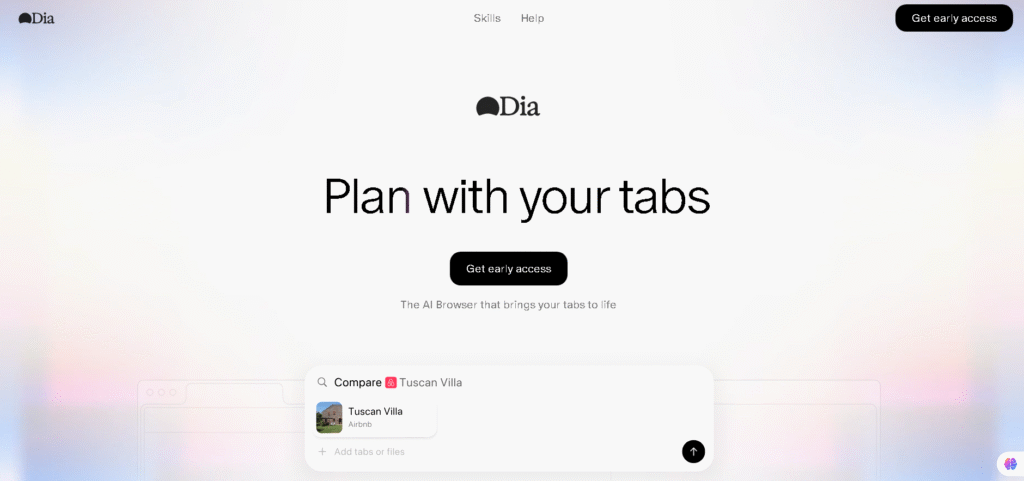
AI-Enhanced Address Bar: Dia's omnibox serves as a conversational AI interface in addition to a URL bar. Natural language commands such as "find my tax documents from last year" or "schedule a meeting with John next Tuesday" can be typed by users.
Skills System: Repetitive tasks can be automated by users creating custom "Skills"—reusable AI workflows. A marketing expert might, for instance, develop a skill that looks through a business' website, finds important contacts, and creates tailored outreach emails.
Multi-Tab Context Awareness: The Dia browser differs from other browsers in that it can recognize the connections between tabs that are open and offer helpful advice according to your current work context.
Privacy and Security Focus
- End-to-end encrypted local data storage
- Minimal processing time on the server (data is erased in milliseconds)
- Control over AI features and data sharing by the user
- Opt-out procedures and transparent privacy controls
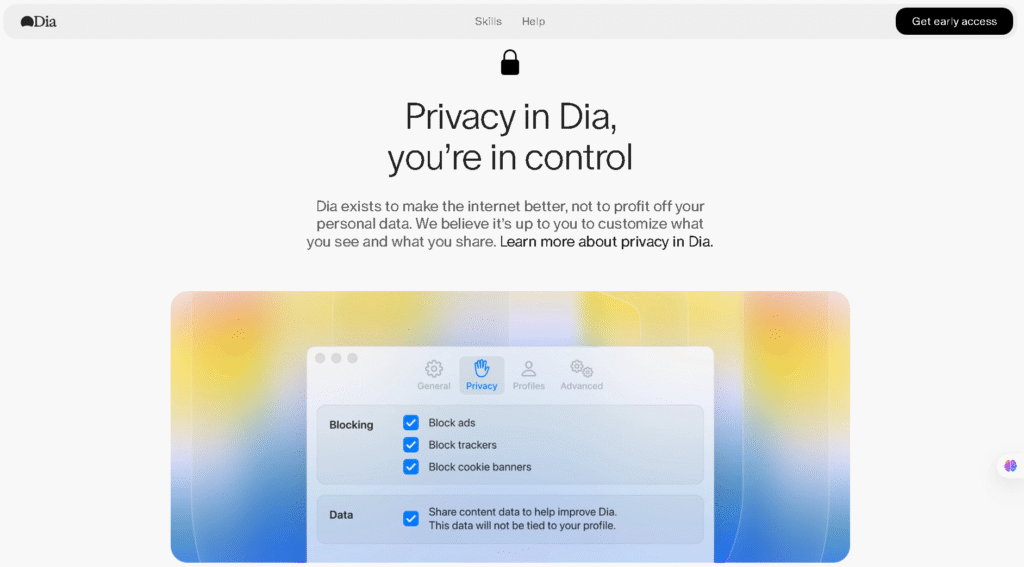
Platform Support
Currently accessible on macOS, with Windows support on the horizon. Closed beta testing is underway for mobile versions.
AI Browsers Compared: Comet vs Dia
Research vs Productivity
Comet vs Dia your main use case will determine which AI browser is best for you:
Comet excels for:
- Scholarly investigation and information integration
- Processing complex queries with citations
- Workflows for voice-driven research
- Comparison and analysis of multiple sources
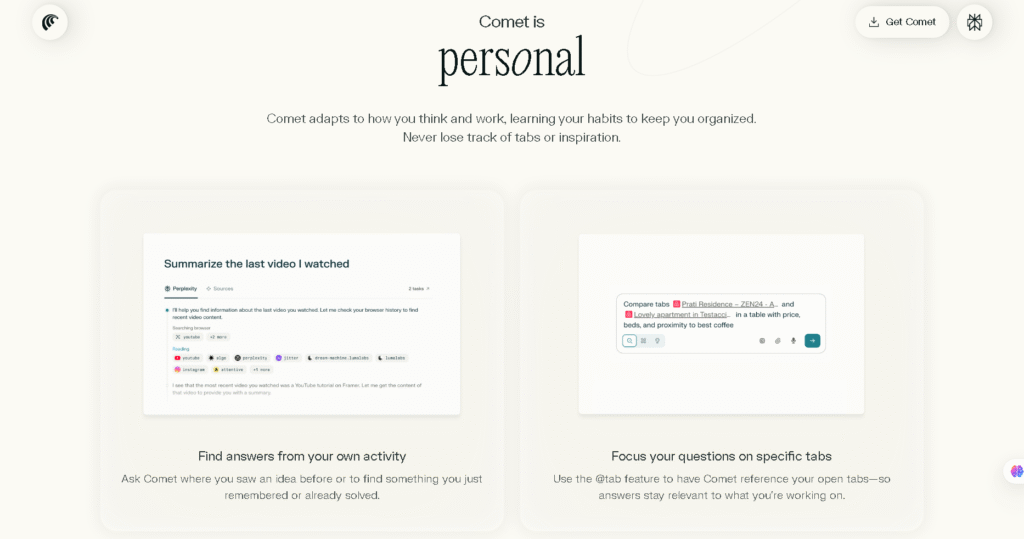
Dia shines for:
- Automation of tasks and daily productivity
- Creating and managing a custom workflow
- Understanding the context of a crosstab
- Optimization of business processes
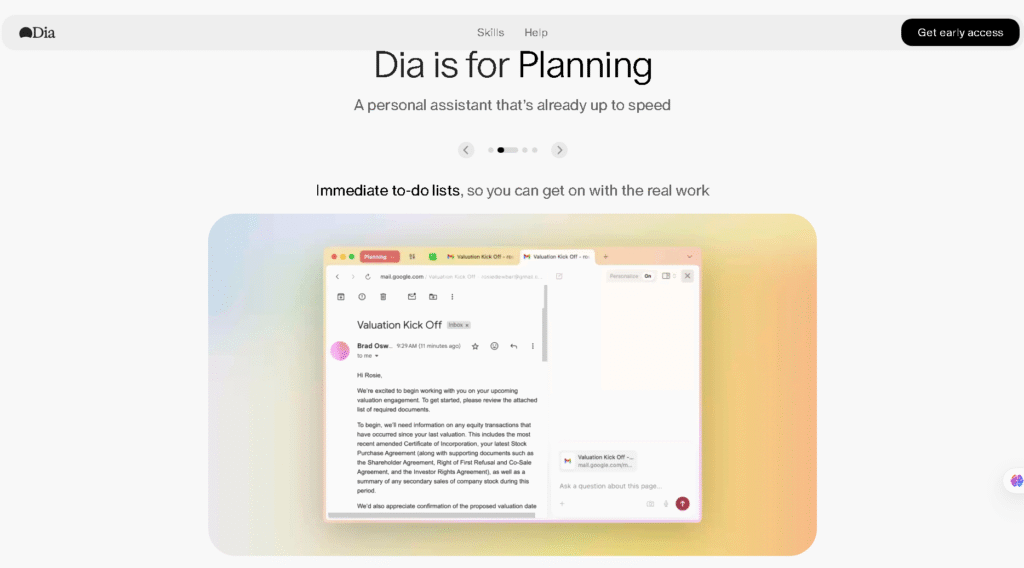
User Experience and Interface
Although they have different ideologies, both browsers have user-friendly interfaces:
- Comet's clear, concise design prioritizes search and research workflows.
- Dia uses adaptable automation features to highlight productivity and task completion.
Performance and Reliability
According to early user reviews, both browsers function well, with:
- Quick answers to AI questions
- Stable browsing performance on Chromium foundation
- Periodic restrictions when performing intricate multi-step tasks
- Constant enhancement via frequent updates
Advantages and Disadvantages of AI Browsers
Benefits of AI Browsers
Enhanced Productivity: The amount of time spent on repetitive tasks and research is greatly decreased by both browsers. Users claim that intelligent help and automated processes save them hours every day.
Contextual Intelligence: In contrast to conventional browsers, these programs are aware of the context of your work and can offer pertinent, timely support without interfering with your workflow.
Future-Ready Features: AI workflows and browser automation get users ready for a digital world that is becoming more and more AI-driven.
Current Limitations
Learning Curve: Effective mastery of both platforms' sophisticated features takes time.
Cost considerations: Because premium features frequently call for paid subscriptions, casual users may find them less accessible.
Privacy trade-offs: Despite security precautions, increased AI capabilities necessitate data processing, which raises valid privacy concerns.
Limited Platform Support: In comparison to well-known alternatives, both browsers currently have limited platform availability.
Future Trends: The Evolution of AI Browsers
What's Coming in 2025 and Beyond
The future of AI-powered web browsing suggests a number of fascinating advancements:
- Advanced Agentic Capabilities: Upcoming updates will allow browsers to perform multi-step, increasingly complex tasks on their own.
- Improved Privacy Solutions: Federated learning and on-device AI processing will solve present privacy issues without sacrificing functionality.
- Enterprise Integration: To better serve enterprise clients with unique business processes, the AI browser's productivity and research features will be expanded.
- Mobile-First Design: With touch-optimized interfaces, mobile versions will enable AI browsing on smartphones and tablets.
Industry Predictions
In 2025, the browser will become the primary agentic AI interface, predicts Bessemer Venture Partners. This forecast is in line with the rising demand from users for intelligent, integrated browsing experiences that integrate task execution and navigation.
Privacy and Security in AI Browsers
Data Protection in AI Browsers
It's still unclear if AI browsers safeguard user privacy. Comet and Dia employ distinct strategies:
Local Processing: To reduce data exposure, Dia places a strong emphasis on local storage and on-device processing.
Enterprise-grade: Encryption is used by both browsers for data storage and transmission.
User Control: Users can manage the use of AI features and data sharing through extensive privacy settings.
Security Best Practices
Users should:
- After installation, check and adjust the privacy settings.
- Update browser versions frequently to apply security patches.
- Recognize the data processing guidelines for AI features.
- For browser accounts, use robust authentication.
FAQ: Common Questions About AI Browsers
What is the difference between Comet and Dia browser?
Comet offers multi-source analysis and deep search capabilities, with a primary focus on research and information synthesis. Dia places a strong emphasis on workflow automation and productivity, enabling users to design unique "Skills" for routine tasks. Whereas Dia excels in everyday productivity and business process optimization, Comet excels in professional and academic research.
How do AI browsers change web browsing?
AI browsers turn passive web browsing into proactive online support. These browsers can perform complex tasks independently, comprehend natural language commands, and analyze content across multiple tabs in place of requiring users to manually search and click through websites. They serve as perceptive go-betweens for users and the internet.
Are AI browsers better than Chrome?
AI browsers have a lot to offer over Chrome for certain use cases. They offer research capabilities, task automation, and contextual intelligence that are absent from conventional browsers. They might, however, have restrictions on the cost, learning curve, and platform support. The decision is based on your unique workflows and needs.
Which AI browser should I use in 2025?
If you value academic workflows, information synthesis, and research, go with Comet. If productivity, task automation, and business process optimization are important to you, choose Dia. When making a decision, take into account elements like price, platform support, and particular feature needs.
What are agentic browsers and how do they work?
AI-powered programs that can comprehend objectives, make plans, and carry out tasks on their own are known as agentic browsers. Large language models and browser automation are combined to carry out intricate tasks like research, travel planning, and communication management without requiring continuous user input.
Can AI browsers automate web tasks?
Yes, a variety of web tasks can be automated with Comet and Dia. Comet is very good at content synthesis, citation tracking, and research automation. With custom "Skills" that can manage data management across multiple websites, email drafting, scheduling, and form filling, Dia specializes in workflow automation.
Conclusion: Choosing Your AI Browsing Future
A new era of web browsers that actively assist you in researching, automating, and completing tasks is heralded by AI browsers like Comet and Dia.
- For professionals, researchers, and students who require in-depth information synthesis, Comet is perfect.
- Knowledge workers and business owners who desire more intelligent workflows and productivity automation will find Dia ideal.
The true question as these technologies advance is not whether or not AI browsers will displace Chrome or Safari, but rather how quickly users will embrace them. You're entering the next generation of browsing, where the internet finally works with you rather than just for you, regardless of the route you take.
At tooljunction, we share honest AI tool reviews and tutorials to help you choose the right tools for your creative projects.





